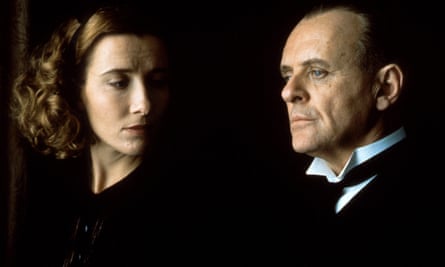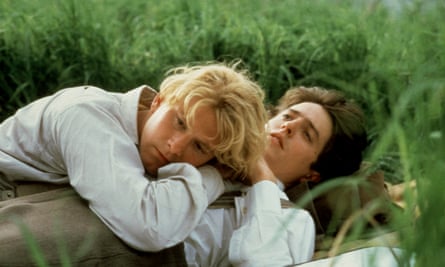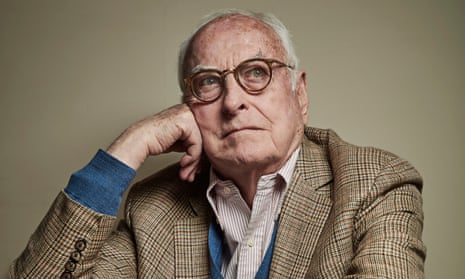James Ivory’s movies revel in the elegance of the swan and simultaneously show how frantically its feet are paddling beneath the water. In the films for which he is best known – 1985’s A Room With a View, 1987’s Maurice, 1992’s Howards End and 1993’s The Remains of the Day, a fraction of his output – we see the effort put into making those rooms look so beautiful; the human cost of controlling your emotions. Cecil (Daniel Day-Lewis) pretending to clean his spectacles after Lucy (Helena Bonham Carter) breaks their engagement in A Room With a View; Stevens (Anthony Hopkins) looking at Miss Kenton (Emma Thompson) as she takes the book out of his hand: Ivory knows that an ocean of emotions can be contained in the smallest gesture.
Ivory, 93, spends most of his time in his 6,000-sq ft home in the Hudson Valley, but when he’s in Manhattan, he stays in the Upper East Side apartment he’s had for the past half-century. He shared it with his partner, Ismail Merchant, who produced his movies, while Ruth Prawer Jhabvala, who wrote most of them, lived downstairs. But Merchant died in 2005 and Jhabvala died in 2013, so now it is just Ivory on his own. When he welcomes me inside on an unseasonably warm October day, he is chipper and bright: “This weather is wonderful, it’s like Los Angeles,” he smiles. He is, as usual, very busy.
Three years ago he became the oldest ever Oscar winner when he won best adapted screenplay for Call Me By Your Name. He’s now editing a film about Kabul he began in 1960, while writing a screenplay for the adaptation of The End of Eddy, the bestselling French novel by Édouard Louis about a gay boy. Plus, he has to talk to journalists like me about his new book, Solid Ivory, which is a collection of older writings and some new about the people he met, the places he’s been – everything, really, except the films he made. “This is not a film book. These are just memories of all kinds of things that have nothing to do with films,” he says firmly. Anyone hoping to read cosy reminiscences of Heat and Dust will find instead Ivory recalling the time when he was five and he and a friend took turns sticking their penises into each other’s mouths and, later in life, his affair with Bruce Chatwin, which he also describes in unsparing detail. (“I thought Jim was a Victorian,” Helena Bonham Carter says of the first time they met. “How wrong I was.”)

So Ivory has no difficulty keeping busy. “It’s nice to have something to be thinking about,” he says. The apartment is filled with books that reflect his wide-ranging interests – Buddhism, Picasso, Venice – but the main room is dominated by a beautiful portrait of Merchant. On the floor are large boxes with “ISMAIL” written across the top. “Oh yes, I’m totally surrounded by him,” he agrees. Ivory has been going through Merchant’s extensive correspondence, including all the letters he himself sent over the course of their 44-year relationship. What did he say in his letters?
“Oh, practical things,” he shrugs. “Except when we were making a film in India, and he had to go to New York and London. I hated being in India by myself. I missed him. So there’s a lot of that.” As he speaks, he adjusts his cuffs.
Ivory and Merchant – one from Oregon, the other from Mumbai – met in New York in 1961. “To this day, whenever I pass the grand doorway and fine, wide steps of the Indian Consulate in Manhattan, I think: why is there no plaque stating that it was on this very spot that Ismail Merchant and James Ivory first met?” he writes in Solid Ivory. (Merchant, always more of a showman than the quieter Ivory, told people that there actually was a plaque at the coffee house around the corner where they then headed.) Two days later, Merchant visited Ivory at his apartment – and that, for both of them, was that, personally and professionally.
“We gave each other strength and we made our kinds of films, despite all the misgivings of people. But we had a goal and we stuck to that goal. It could have been politics. Maybe that will happen one day, you’ll have two gay men ruling some countries!” smiles Ivory.

While Merchant was alive, it was never publicly acknowledged that the two were a couple, because he came from a conservative Muslim family in Mumbai. I ask if the secrecy was difficult for Ivory, but he interrupts before I finish.
“No no no no no! People seem to think there was some strain. It was nothing like that!” he says, baffled by this modern world in which happiness is dependent on public acceptance. The two men were together for more than 40 years, although not monogamously, mainly but not solely on Merchant’s side. Were there jealousies?
“Are you kidding? Of course! Constantly! Ismail didn’t exactly have a roving eye, but he had other friends,” he says. One of these other friends was Richard Robbins, who ended up composing the music for Merchant Ivory films. “Anybody that Ismail became intimate with had to then have a purpose – they got drafted,” Ivory smiles. Merchant died in 2005 while being treated in a London hospital for bleeding ulcers. He was 68. “I got myself back to New York somehow and then I went into shock, once I got home. That lasted for several months. Ruth was downstairs, but I hated being alone in this apartment, so various friends took turns staying the night here,” Ivory says, and adjusts his cuffs again.

Ivory was adopted as a baby and raised in Oregon. He recently found out that his biological parents were Anglo-Irish, specifically from London and Dublin, “and that makes sense to me,” he says. The food at his Catholic school was disgusting, but instead of this putting him off food, it made him determined to have “nice things to eat on all occasions”, he writes, and those who have worked with him talk about the delicious dinners he has thrown for them in New York, England, Italy and India. When boys at school laughed at him when he said he wanted a doll’s house for Christmas, instead of feeling shame, “I began to think of myself as something more, in the sense of being distinct and perhaps also higher in value,” he writes in Solid Ivory.
Despite his father being so repressed about sex that Ivory compares him in his book to the butler Stevens in The Remains of the Day, he himself never felt any anxiety about his homosexuality. “I felt that if I was doing it and wanting it, it was OK. I said this to a friend once and he said: ‘Jim, that’s the attitude of a serial killer!’ And if it is, it is!” he says. Ivory opted for film-making over killing, and began by making documentaries. Then he met Merchant, who suggested adapting Jhabvala’s novel The Householder, and a trio was born.
Merchant Ivory films were phenomenally successful, especially from the 1980s with the EM Forster adaptations, winning seven Academy Awards between them; Ivory himself was nominated three times before winning in 2018. Actors remained loyal to him throughout their careers. “James is devoted to beauty, which is nowadays an undervalued trait. He’s also extremely nice, which means people who start working with him want to go on working with him,” says Samuel West, who starred in Howards End, which he describes as “one of the happiest experiences of my professional life.”
And yet there remains a certain sniffiness around Merchant Ivory films, an attitude that they’re “just” costume dramas. I ask Ivory if he feels he doesn’t get the respect another similarly successful director would. “A bit. Yes. It irritated me very much when the English film critics would reduce [the films] to the interiors, the culture. When Maurice came out, there wasn’t a single English critic who praised it wholeheartedly, even though every single one of them was gay. It is shocking to think back” Ivory addresses this, and several other bugbears, in his book, including his falling out with the director of Call Me By Your Name, Luca Guadagnino. “I can’t be bothered if he’s upset [by the book],” he says, with a merry shrug.
“What I most admire about Jim is that he’s never stopped evolving,” says Bonham Carter. “The introvert’s defences have melted now he’s in his 10th decade and he’s blooming and liberated, more himself than he ever was.”
It’s time for Ivory to get back to work, but as I reach to turn off my recorder, he stops me: “Just one thing. I keep being asked, was it difficult, your life? No! I’m sorry if people are disappointed to hear that, but I don’t know what to say. I have not suffered because of my long relationship with Ismail or because of other people. My life has not been difficult. My life, if anything, was too easy.”
Solid Ivory by James Ivory is published by Corsair on 2 November.
